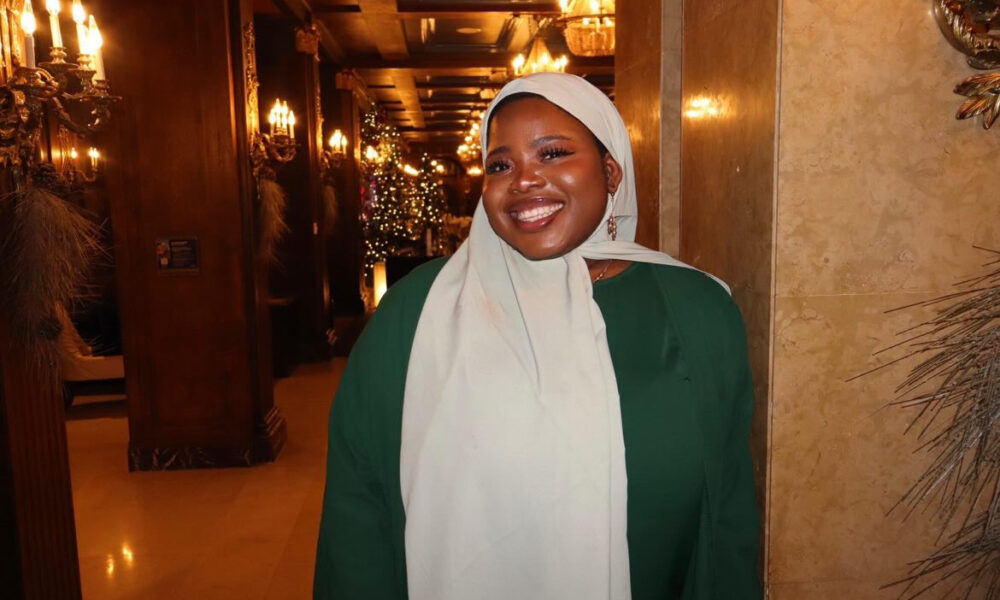Khadijatu-Dimalya Ibrahim is driven by a simple yet powerful belief: Change starts at home. Before tackling global issues, she prioritizes uplifting and supporting those immediately around her. A U2 student in Software Engineering and Islamic and African Studies, Ibrahim is a source of positivity and kindness, dedicated to leaving a lasting impact on and off campus.
As co-founder of the Black Muslim Association (BMA), Ibrahim has helped create space for Black Muslim students to find community, education, and self-empowerment. Her impact has not gone unnoticed; this year, she received the Centre Culturel Islamique de Québec (CCIQ) Memorial Award, which honours the six men who lost their lives during the 2017 Quebec City mosque attack. The award recognized her work advocating for Muslim inclusion, particularly for Black Muslims.
Ibrahim’s advocacy began well before her time at McGill. As President of Dawson College’s Muslim Student Association (MSA), she led initiatives combining activism and community care. In 2021, she spearheaded a bake sale that raised $4,000 CAD for the Nisa Foundation, a non-profit organization providing shelter, financial assistance, and resources for Muslim women and families in need. Ibrahim also hosted an event called “Try the Hijab,” inviting non-Muslims to experience wearing the hijab to challenge misconceptions and humanize the experience of women wearing the hijab.
Her desire to embrace intersectionality and create spaces for others to do so in a world that often forces compromise led her to co-found BMA at McGill.
“It’s wanting to balance both of my identities without having to forego any of them,” she shared with The Tribune. “In certain spaces, it’s more my ethnicity that takes precedence; it just so happens that there are some activities I can’t do. There is a cognitive dissonance where you pick, [and] either leave your faith at the door [or your ethnicity], and I wanted both activities that deal with my faith and people that look like me too.”
Through the BMA, Ibrahim seeks to educate Black Muslim students about their rich history, culture, and religion, all while challenging stereotypes around African culture. The association hosts events fostering unity and support for Muslim communities in Montreal, including a recent food drive on Feb. 1 for the Sister Sabria Foundation. While she aims to challenge anti-Muslim prejudice, her primary focus is on building a strong community for Black Muslims on campus, with hopes of expanding her reach internationally, particularly to the U.S. and African countries.
“Black spaces are important for ourselves—for us, by us,” she told The Tribune. “We really want to […] allow people to enjoy who they are.”
However, her work is not limited to the Black Muslim population. While balancing academics and extracurriculars, Ibrahim also finds time to volunteer at the Bilal Islamic and Cultural Center of Quebec in Montreal, organizing local events to strengthen bonds and representation.
Receiving the CCIQ Memorial Award on Jan. 3 was deeply meaningful for Ibrahim. It highlighted the importance of remembering the 2017 tragedy, combating Islamophobia, and humanizing Muslim communities. Ibrahim shared how her father, a devout man who attends mosque each morning, is constantly subject to the lingering fear of Islamophobic violence.
“I saw my dad in these men. And, even if I didn’t see my dad in these men, they are human lives,” she explained.
Appearing on CityNews Montreal to discuss her award was another milestone in her advocacy, allowing Ibrahim to reach an audience beyond social media.
Looking ahead, Ibrahim hopes people take away from her experience that university degrees, personal interests, and even hobbies can play an important role in helping local communities and creating cultural spaces.
“University is the only place where you’re sheltered but also an adult. You can easily protest, and while it can be a process where you are lonely, university makes you navigate with [like-minded people],” she said. Ibrahim’s work exemplifies the power of leadership and self-empowerment. By embracing her intersectionality and challenging the barriers that come with it, she has created a space for others to do the same.
“The main point is […] equipping us with the knowledge we need to be proud and confident whether it comes to our culture or our faith as well.”









